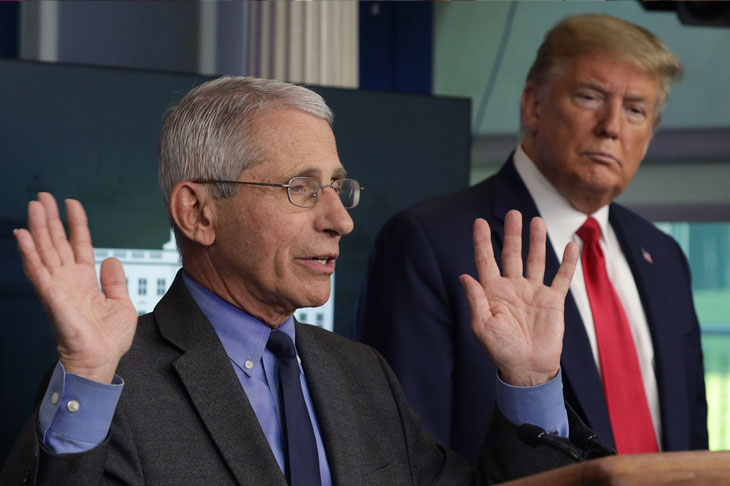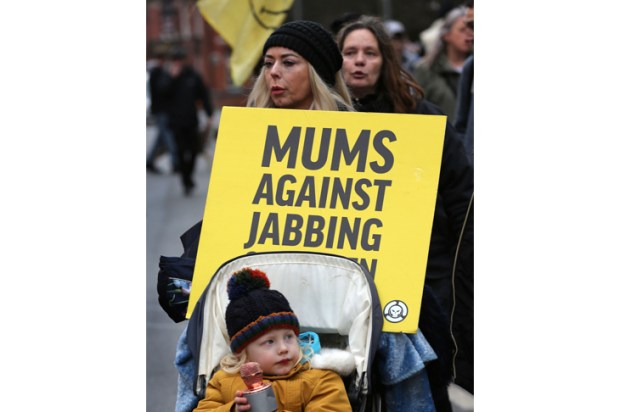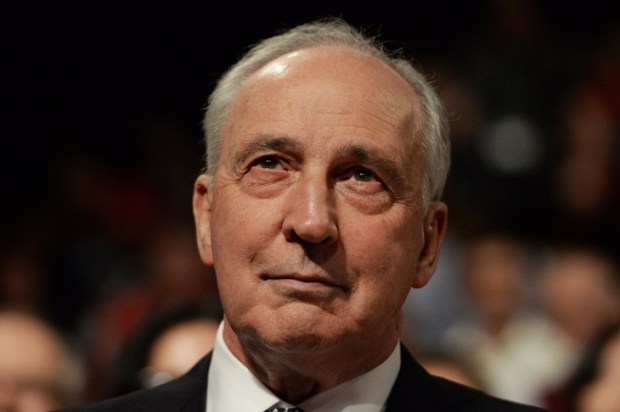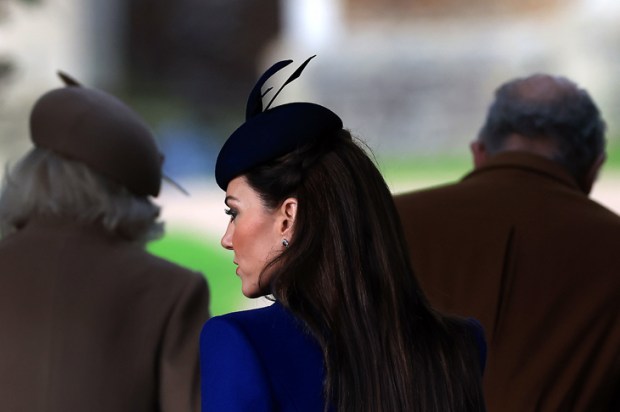As Dr Tony Fauci — the top US official handling Covid-19 drugs — goes into quarantine, it’s interesting to speculate what treatment he’ll take if he succumbs to the virus.
In 1658, Oliver Cromwell perished from malaria because he refused to take quinine. He mistrusted the ‘Popish powder’ made from the Jesuits’ bark — from which hydroxychloroquine (HCQ) is also derived — because it had been brought to Europe by Catholics and was lauded in France, Italy and Spain.
Over 350 years later, history seems to be repeating itself. HCQ — usually paired with the common antibiotic azithromycin — is being used with great effect in Italy, Spain, Portugal and parts of France against Covid-19, but has been attacked and rejected in much of protestant America and the UK.
You’d think Fauci’s choice would be easy. Way back in early to mid January, when China still wasn’t admitting Sars-Cov-2 was contagious, it tested every drug that showed promise treating the original Sars in test tubes to see what might work with the new virus. There were two front runners. A cheap generic with a well-known safety profile — chloroquine (CQ) and its even safer analogue HCQ — and remdesivir (RDV), an unknown, experimental drug under patent to Gilead Sciences (GILD).
GILD has a well-earned reputation as an aggressive pharmaceutical giant. It has been in a patent stoush with the US government over an HIV drug. It was sued by Aids sufferers who said it failed to replace an unsafe HIV drug with a safer one it had already developed until the first drug’s patent ran out. And it has been accused by Democrat Senator Ron Wyden and Republican Senator Chuck Grassley of grossly inflating the price of its hepatitis C drugs even though it knew this would put the treatment out of the reach of millions. ‘If Gilead’s approach to pricing is the future of how blockbuster drugs are launched, it will cost billions and billions of dollars to treat just a fraction of patients,’ Wyden said.
Despite that, Fauci ignored the cheap generic and ploughed $70 million of taxpayer money into trials for RDV, the WHO committed to trialling it too, and for good measure the Wuhan Institute of Virology quietly lodged a patent application covering China for RDV on January 21, before it released the results of its secret trials. None of them were interested in HCQ and, despite the WHO belatedly agreeing to add HCQ on to its large multi-country clinical trials, they still are not.
The results of CQ and HCQ in Chinese trials in February were so impressive that an expert committee — headed by Zhong Nanshan, the scientist who pioneered the effective treatment of Sars —declared that it be incorporated as standard treatment. Since then, at least five other trials into the two drugs and an avalanche of evidence from countries in the Mediterranean, Africa, Latin America and Asia have shown they reduce mortality, reduce viral load , reduce hospitalisation, reduce progression to severe illness, and speed up recovery, particularly when treatment is started early. Yet it was two months before HCQ received from the US FDA an Emergency Use Authorisation (EUA) in US hospitals while preventing non-hospitalised patients from accessing the government’s stockpile of the drug. So even though HCQ is cheap and major pharmaceutical companies have donated nearly 50 million doses to the Strategic National Stockpile, most are sitting in warehouses unable to be accessed by outpatients where it is most effective.
And RDV? The first peer-reviewed, randomised, double-blind, placebo-controlled trial of RDV was published in the Lancet on 29 April and it was clear cut. RDV was not just a dud, 66 per cent of patients had adverse events including multiple organ dysfunction, septic shock, acute kidney injury, low blood pressure, liver damage and acute respiratory failure. Did that deter Fauci? Not at all. He decided to release the results of his trial early and claimed they showed patients got better four days faster and there was a slight, statistically insignificant, improvement in mortality. We’ll have to take his word for it because he didn’t release any data, much less subject it to peer review.
The US medical establishment was not impressed. A specialist who has conducted dozens of clinical trials, told the New York Times: ‘The disclosure of trial results in a political setting, before peer review or publication, is very unusual. Scientists will need to see figures on harms associated with the drug in order to assess its benefits…. This is too important to be handled in such a sloppy fashion.’ Meanwhile, Professor Didier (‘Getafix’) Raoult, a leading specialist in infectious diseases and champion of HCQ, pointed out that the NIH researchers had changed the primary outcome of the trial just two weeks before completion, from number of deaths to number of days to recovery, allowing the trial to be declared a success, of sorts, and not an outright failure. Yet, on the basis of the invisible study, Fauci said RDV would become ‘standard of care,’ and the FDA issued an Emergency Use Authorisation (EUA) for its use with seriously ill hospitalised patients.
Why would Fauci do this? Who knows, but it would have been warmly supported by many on the panel that decides which Covid-19 treatments to approve and which just happens to have nine members who disclosed financial ties to GILD and many others with ties they failed to disclose or which don’t require disclosure. There are also no shortage of medical and scientific experts lining up to promote RDV and which just happen to have received financial benefits from GILD. Dr Jean-Michel Molina and Dr Constance Delaugerre, who received more than $100,000 from GILD, ran a trial they claimed showed no evidence of clinical benefit using HCQ+AZT in patients with severe Covid-19 infection. Yet what the Molina study actually showed, if anything, was that in 11 patients who were gravely ill with Covid-19, and who were treated with HCQ+AZT, only one died — an astonishingly good outcome considering that 8 of the 11 had serious co-morbidities associated with poor outcomes including obesity, cancer and HIV infection. Professor Katherine Seley-Radke who agreed with Molina in a syndicated article on the Conversation consults to and owns shares in GILD.
Many in the mainstream media have made no secret of the fact that they want HCQ to fail because it was touted by Trump. Others seem to want the virus to do as much damage as possible in the hope that it destroys his chances of re-election. As one journalist put it, ‘Remdesivir may not be the effective coronavirus treatment the world desperately needs, but it has… one strong point in (its) favour: the Make America Great Again crowd hates it.’
Got something to add? Join the discussion and comment below.
Get 10 issues for just $10
Subscribe to The Spectator Australia today for the next 10 magazine issues, plus full online access, for just $10.
You might disagree with half of it, but you’ll enjoy reading all of it. Try your first month for free, then just $2 a week for the remainder of your first year.














Comments
Don't miss out
Join the conversation with other Spectator Australia readers. Subscribe to leave a comment.
SUBSCRIBEAlready a subscriber? Log in